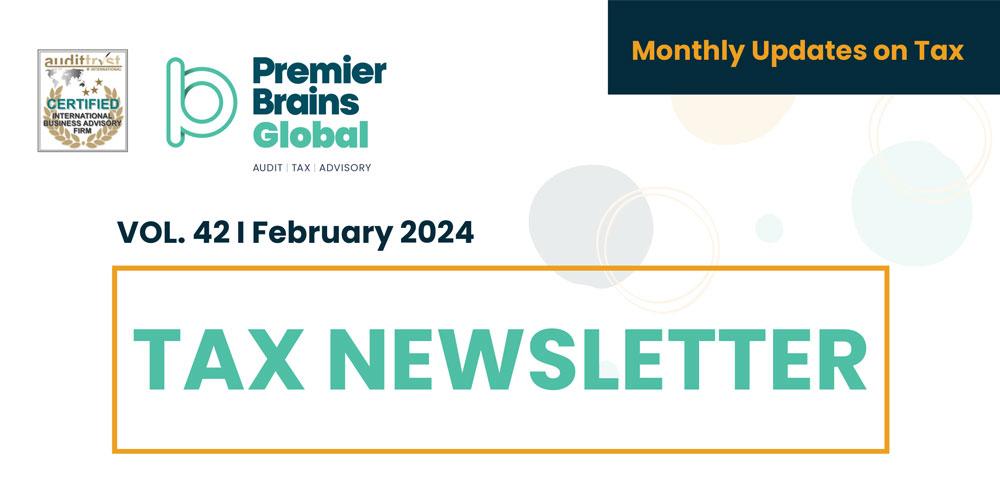United Arab Emirates (UAE)
Corporate tax (“CT”)
Timeline for Corporate Tax Registration
On 22nd February 2024, The Federal Tax Authority (‘FTA’) issued Federal Tax Authority Decision No. 3 of 2024 on The Timeline specified for Registration of Taxable Persons for Corporate Tax. This decision shall come into effect from 1st March 2024.
With respect to this decision, a taxable person is required to submit the Corporate Tax registration application with accordance to the timeline specified in this decision. This decision mentions timelines for:
- ●
- Resident Juridical Persons incorporated or otherwise established or recognized prior to the effective date of this Decision
- ●
- Resident Juridical Persons incorporated or otherwise established or recognized after the effective date of this Decision
- ●
- Non-Resident Juridical Persons that is a Non-Resident Person prior to the effective date of this Decision
- ●
- Non-Resident Juridical Persons that is a Non-Resident Person after the effective date of this Decision; and
- ●
- Natural Persons
Click here to read our detailed Blog
Amendments to the Administrative Penalties related to Corporate Tax
On 10th July 2023, The UAE’s Ministry of Finance had issued Cabinet Decisions No. 75 of 2023 on the Administrative Penalties to be imposed on Taxpayers for Violations of UAE Corporate Tax Law.
These administrative penalties will be applied with the concerned violations of the Tax Procedures mentioned the Federal Decree-Law No. (28) of 2022 on Tax procedures and the Federal Decree-Law No. (47) of 2022 on Taxation of Corporate’s and Businesses.
Recently on 22nd February 2024, Cabinet Decision No. 10 of 2024 was issued that amended the previous administrative with the addition of a administrative penalty related to Corporate Tax.
Addition
- ●
- Failure of the Taxable Person to submit a Tax Registration application within the timeframe specified by the Authority in accordance with the Corporate Tax Law – Penalty of AED 10,000
Click here to read the official decision
Value-Added Tax (“VAT”)
Amendments to Tax Refunds for Tourists scheme
On 1st March 2024, The Federal Tax Authority (FTA) issued decision No. 2 of 2018 on Tax Refunds for Tourists Scheme and its amendments. The UAE VAT law had allowed tourists to claim a refund on the tax they paid on purchases made when visiting the UAE, starting from November 2018.
In the recent amendments, it was relating to:
- ●
- Article 2 – Purchase Procedures to be followed by retailers when an Overseas tourist requests to make a purchase under the Tourist refund Scheme.
- ●
- Article 4 – Fees and Refund
Click here to read the official public clarification
Kingdom of Saudi Arabia (KSA)
ZATCA announces changes to payments for ZATCA-related services
On 20th February 2024, Saudi Arabia’s Zakat, Tax and Customs Authority (ZATCA) has announced that the taxpayers must use the Invoiced Number (020) in payment operations through all payment systems when paying zakat, tax, and customs dues by highlighting that the previously allocated Invoiced Number (030) allocated for customs services was canceled and the new Invoiced number (020) must be used for payments for ZATCA-related services.
Click here to read the official announcement
Tax rules for regional headquarters (RHQ)
On 4th February 2024, Saudi Arabia’s Zakat, Tax and Customs Authority (ZATCA) issued Regional Headquarters Tax Rules which was introduced as a part Saudi Arabia’s Vision 2030 which aligns with the nation's overarching goal to attract foreign direct investment.
The Rules relating to the new initiative are as follows:
- ●
- As per the rules, a RHQ is regarded as a unit of a multinational group duly established under the laws of Saudi Arabia engaged in the eligible activities.
- ●
-
Eligible activities are defined as activities that serve to strengthen the multinational group’s profile in the region by providing:
- ●
- strategic supervision
- ●
- administrative guidance; and
- ●
- support for the business activities, subsidiaries, and other related companies according to the national classification of economic activities bearing number 701011
- ●
- The regulations differentiate the eligible and non-eligible income of an RHQ for the purpose of tax incentives.
- ●
- Income from non-eligible activities is not entitled to tax incentives and is subject to applicable tax laws and regulations
- ●
-
A unit of a multinational group qualifying to be an RHQ and engaged in eligible activities, is entitled to the following tax incentives:
- ●
- Zero percent corporate income tax on income from eligible activities.
- ●
- Zero percent withholding tax on dividends, payments to related persons, and payments to third parties for services essential to the RHQ.
- ●
- The duration of the tax incentives is set for a period of 30 years, subject to renewal.
- ●
-
HQ is required to comply with the economic substance requirements, which include:
- ●
- Holding a valid license and conducting activities as mentioned in the license
- ●
- Having adequate business premises in the Kingdom
- ●
- Managing RHQ activities in the Kingdom, including holding strategic meetings.
- ●
- Incurring operating expenditure in the Kingdom that is commensurate with the activities of the RHQ
- ●
- RHQ’s employees possessing requisite qualifications and skills.
- ●
- Registration with the Zakat, Tax and Customs Authority (ZATCA), and filing returns in accordance with the applicable tax laws and regulations are mandatory.
- ●
- Maintaining books and records is compulsory for RHQ, which include maintaining separate accounts for eligible and non-eligible activities.
- ●
-
Non-compliance with the tax rules may result RHQ being imposed to the following penalties:
- ●
- SAR100,000 provided that the violation is remedied within 90 days from the date of the imposition of the penalty.
- ●
- SAR400,000 in the event that the violation is not remedied within 90 days or in the event that an RHQ repeats the same violation within 3 years from the date on which the penalty was imposed, provided that the violation is remedied within 90 days.
- ●
- In case the violation persists in spite of the penalties, tax incentives accorded to an RHQ may be revoked.
- ●
- An RHQ is required to comply with the transfer pricing by-laws.
- ●
- RHQ is subject to the provisions of anti-avoidance and tax evasion provisions stipulated in the relevant Tax Laws.
Click here to read the official rules
Oman
Tax Liability Settlement Initiative
The Oman Tax Authority’s (OTA) Department of Human Resources had issued the ‘Global Banks Initiative’ that assists employees in setting individual goals and recognizes the significance of the Individual Performance Measurement and Institutional Proficiency System, also known as Ejada, as one of the key pillars of Oman Vision 2040.
This initiative resulted in 128 goals across various positions within the Authority, the initiative ran for three months, from November 2023 to January 2024, with the goal of improving individual performance and connecting it to the Tax Authority's primary objectives while maintaining institutional proficiency.
The initiative is expected to develop employees’ performance and skills by defining clear goals for strategic planning, task prioritization, and progress assessment. It also seeks to encourage a culture of collaboration, achieve system goals, raise productivity, and improve performance by increasing employee performance efficiency.
Click here to read the official announcement
Tax Authority conducts field inspections in Dhofar
The Oman Tax Authority (OTA) had conducted field inspections at various cigarettes and tobacco selling stores in different locations in Dhofar to ensure the trade of products and goods bearing tax stamps.
This came as a part of the digital tax stamp control campaign to enhance tax awareness and tax compliance of taxpayers and nearly 150 different locations were examined, and goods without digital tax stamps were confiscated.
The Tax Authority launched Taakad app at the beginning of last year initially targeting cigarettes, tobaccos and similar products to authenticate tax stamps on goods subject to excise tax and the OTA calls for the attention of all consumers to use the ‘Taakad’ app to check the quality of goods and ensure that they are authentic and not adulterated as the digital stamp scheme is soon to be applied on a larger scale to include carbonated and sweetened drinks.
Click here to read the official announcement
Kuwait
Corporate Income Tax law
As it is known that Kuwait does not impose corporate income tax (CIT) on companies wholly owned by the nationals of Kuwait or other Gulf Cooperation Council (GCC) countries (Bahrain, Oman, Qatar, Saudi Arabia, and the United Arab Emirates).
However, GCC companies with foreign ownership are subject to taxation to the extent of the foreign ownership. CIT is imposed only on the profits and capital gains of foreign 'corporate bodies' conducting business or trade in Kuwait, directly or through an agent.
Income earned from activities in Kuwait shall be considered subject to tax in Kuwait on the basis that it is Kuwait-sourced income. In cases where a contract involves the performance of work both inside and outside Kuwait, the entire revenue from the contract must be reported for tax in Kuwait, including the work carried out outside Kuwait.
The current Corporate Income Tax rate in Kuwait is a flat rate of 15% and foreign companies carrying on trade or business in the offshore area of the partitioned neutral zone under the control and administration of Saudi Arabia are only subject to tax in Kuwait on 50% of their taxable profit under the law.
 United Arab Emirates
United Arab Emirates


